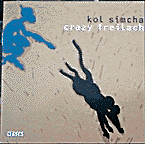Kol Simcha / Crazy Freilach

Kol Simcha
Crazy Freilachs
Claves, CD 50-9628, 1996
Kol Simcha is an interesting example of a new form of klezmer. Actually, it's not klezmer any more. When one listens to the flute or clarinet wail, it isn't a typical klezmer progression that follows, there is no kvetch or krekhts. Instead, the progressions are those of jazz. The result is an energetic jazz based on Jewish themes (klezmer and Israeli), but not one that would insist that one dance. In its own way, this mirrors the avant garde work of groups such as Kletka Red, which also starts from Jewish source material, but ends up somewhere else, such that, but for the label, one would not have known that it was once Jewish.
The group has achieved some popularity in Israel, and even more in Europe where jazz reigns and klezmer influences are most popular. Here in the United States, the group's work has long been represented only by an earlier album available on the "Hearts of Space" label, although a tour is in the offing for Fall 1997. On the earlier recording, this was labeled "contemporary klezmer." The word "contemporary" is often used as a code for "modern jazzish easy listening that will sound good to fans of Kenny G and George Benson," although I think that this music is better than most of that genre.
Okay, back to the music on this album. A song such as "Jerusalem," while entirely pleasant, also manages to convey none of what living in Jerusalem for years meant to me. There are echoes of Israeli movie music in the piano improvisations, and certainly a beat that catches a tinge of debka and of the Middle East, but that isn't the same thing. The "Flatbush Minyan Bulgar" has nothing of Brooklyn's Flatbush, and certainly nothing of a bulgar, but it is quite nice on its own terms. The same can be said of "Rebbe's Tisch," a lovely, thoughtful, gentle piece with no recognizable Chasidic themes, or "The Little Rascals' Bulgar which uses a doina form at the beginning, but which is just as clearly tied in actual chords and intonation to the lovely (and all-too-often unnoticed) cartoon music. Actually, in this instance, there are moments later into the song when the band does nicely fuse the two forms together in something that conveys feeling from both genres.
This all raises questions about why the band would insist on calling itself a klezmer band, or why it chooses the names for songs that it chooses. On the other hand, there is much to be proud of here in the sense that Jewish music is having such a strong influence on other music forms. You can choose to let that get in the way of enjoying this fine and comfortable jazz album or not.
Reviewed by Ari Davidow, 7/12/97
Personnel this recording:
Michael Heitzler: clarinet
Niki Reiser: flutes
Olivier Truan: piano
Daniel Fricker: bass
David Klein: drums
- Crazy Freilach (Olivier Truan) 4:01
- Mitzwe Tänzel (Olivier Truan) 3:20
- Speedy Hora (David Klein) 2:48
- Jerusalem (Olivier Truan) 6:16
- Flatbush Minyan Bulgar (Michael Heitzler) 7:18
- Rebbe's Tisch (David Klein) 3:48
- Joseph (Niki Reiser) 5:42
- Oli's Freilach (Olivier Truan) 2:42
- The Little Rascals' Bulgar (Michael Heitzler) 5:52
- Anne (Olivier Truan) 5:24
- Swizz Klezmer/quintett-version (Niki Reiser) 7:52
- Anastasia (Michael Heitzler) 4:58

